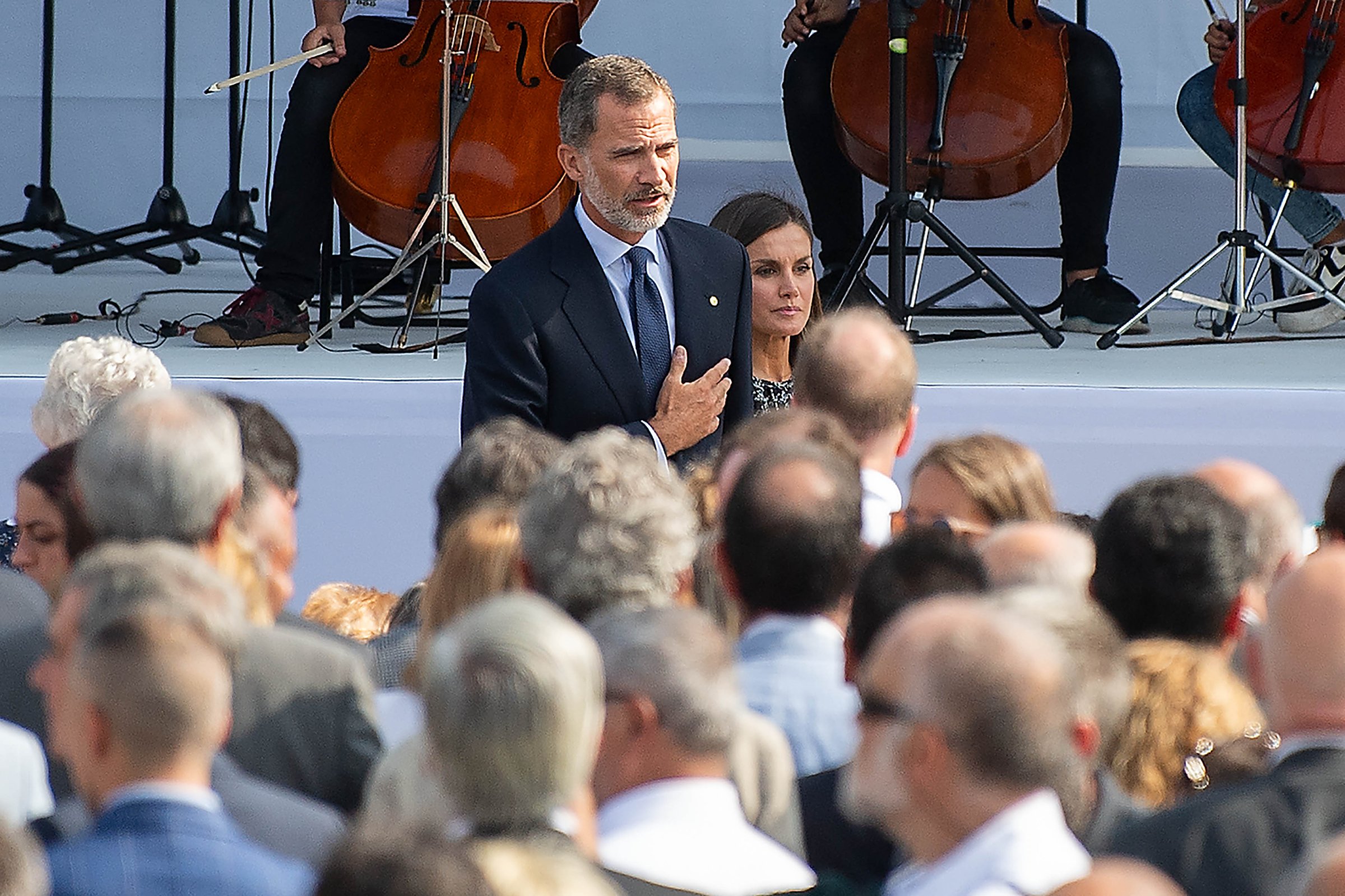
Felipe VI of Spain revisited of one of the most uncomfortable moments of his reign in Barcelona on Friday as part of efforts to show a degree of normalcy has returned to Catalonia after last year’s separatist crisis.
Felipe attended a ceremony to commemorate the victims of last year’s terrorist attacks in Catalonia that left 16 people dead. Pro-independence campaigners hoisted a banner in English in Barcelona’s Catalunya Square saying the king wasn’t welcome but the commemoration of those killed in the attacks passed off largely without incident.
Last time he was there the tragedy took a back seat to politics.
Then, the king was jeered and taunted by separatists waving pro-independence flags when he led mourners in the aftermath of the attack. The day marked the start of a spiral of activism in Catalonia that ended with a failed declaration of independence two months later.
Four years after taking the throne, 50-year-old Felipe is still struggling to re-establish the royal family’s moral authority amid press reports about his father’s affairs and his brother-in-law serving a six-year jail term for corruption.
Divisive Figure
Catalonia’s push to breakaway from rest of Spain has been his biggest challenge and at times he has struggled to find the right tone. Many Catalans felt alienated by Felipe’s hardline speech last October, two days after images of Spanish police beating voters at illegal polling stations had shocked the world.
“The King is a very polarizing figure in Catalonia,” said Jordi Munoz, a political science professor at Barcelona University, who favors independence. “Traditionally the support for the crown here is low.”
Felipe’s reception in Barcelona was quieter this time round.
Small groups against and in favor of his presence in Barcelona congregated ahead of the events and there were isolated boos as well as calls of “Long live the King.” Young people from different religious backgrounds read the poem “For Whom the Bell Tolls” by John Donne and schoolchildren sang Imagine by John Lennon and “Hallelujah” by Leonard Cohen.
More than 60 percent of Catalans have no trust at all in the Spanish monarchy, according to an October 2017 survey by the Catalan regional government. While Felipe’s support nationwide is stronger, it’s still lower than other royal houses, according a separate poll carried out by Ipsos.
About 37 percent of Spaniards would like to end the monarchy, compared with 15 percent in the U.K., 17 percent in Belgium and 23 percent in Sweden, according to the Ipsos survey of 1,000 people. Two thirds of Spaniards between 25 and 34 years want a referendum on the issue and even among those over 60 support is over 40 percent.
Compromise Crown
When the dictator Francisco Franco died in 1975, “a significant part of Spanish left accepted the monarchy as the price to pay for having stability and democracy,” said Munoz. “It’s relatively normal that some people, especially on the left and among the young, think the price is no longer acceptable.”
While mainstream separatist groups have pledged not to disrupt Friday’s ceremony with political protests, the ouster of Prime Minister Mariano Rajoy, who ordered last year’s crackdown on the push for independence, has left separatists seeking a new focus for their opposition so the event will nevertheless offer a gauge of the mood.
“Separatists have made the King their target,” said Gabriel Colome, a political science professor at Autonomous University of Barcelona who has also served as a Socialist councilor in the city government. “His arrival gives the most radical faction of the separatist camp a chance to show once again their rejection of the institution.”
More Must-Reads from TIME
- Donald Trump Is TIME's 2024 Person of the Year
- Why We Chose Trump as Person of the Year
- Is Intermittent Fasting Good or Bad for You?
- The 100 Must-Read Books of 2024
- The 20 Best Christmas TV Episodes
- Column: If Optimism Feels Ridiculous Now, Try Hope
- The Future of Climate Action Is Trade Policy
- Merle Bombardieri Is Helping People Make the Baby Decision
Contact us at letters@time.com